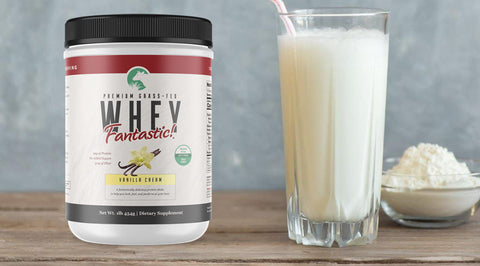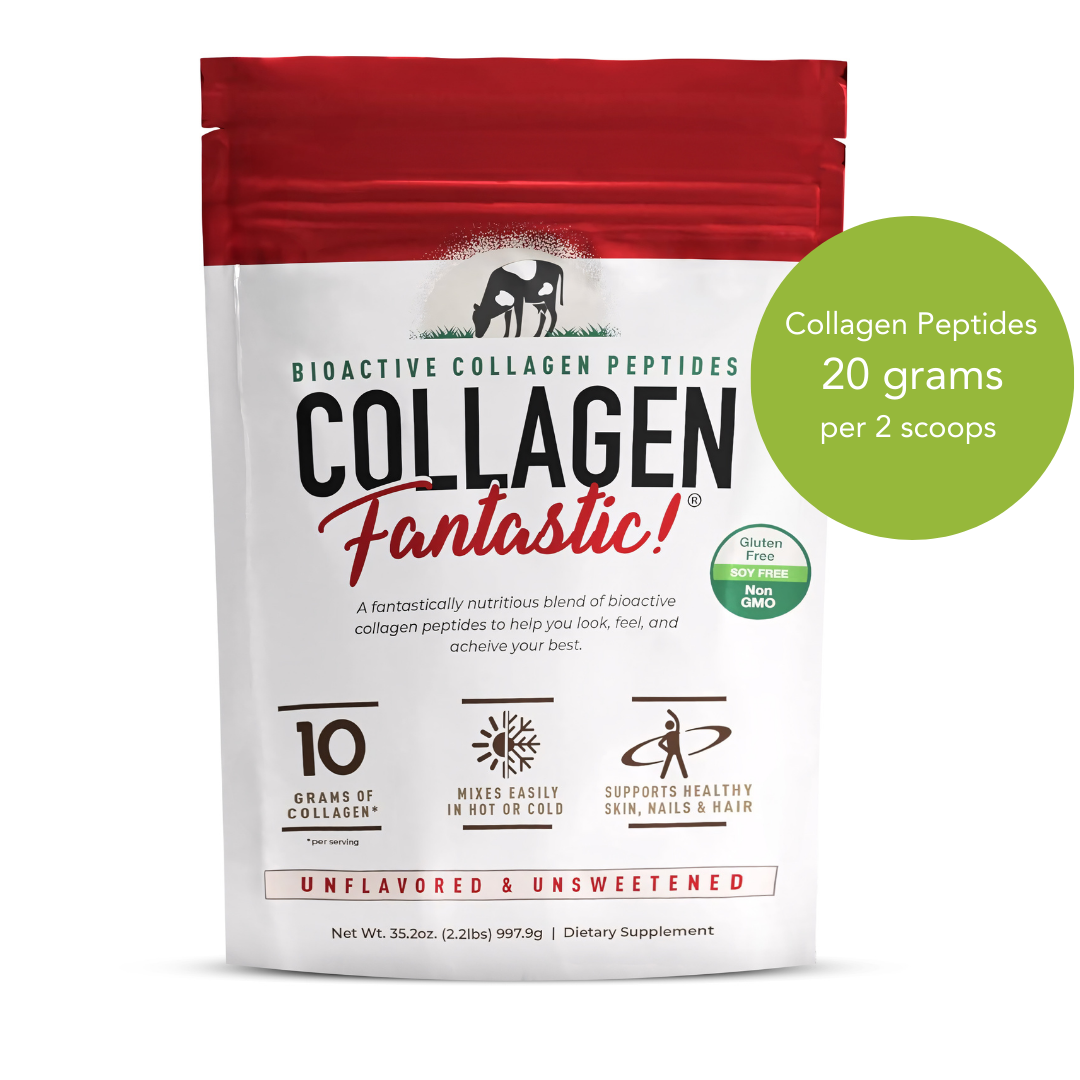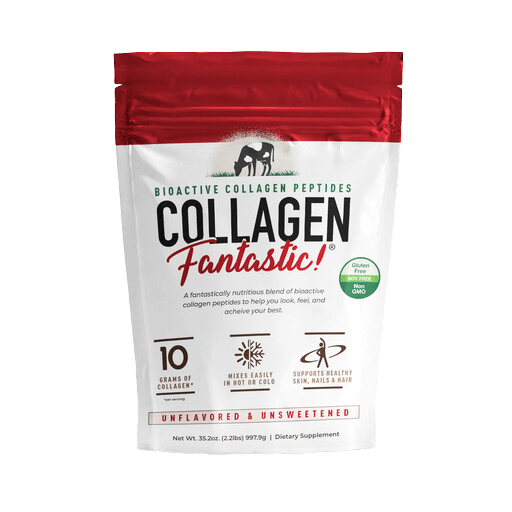Are you intimidated by all the different supplements out there on the market? Having trouble narrowing down which ones to take?
You may be stuck on whey protein vs. BCAAs. Should you be taking both? Is one better than the other? What are the differences?
We’ll cover all those questions and more in this post, so let’s dive in. Read on to the end for a special offer!

What Is Whey Protein?
That sloshy, sludge-looking mixture at the top of your yogurt before you stir it, that’s whey. Another way to think about whey is it’s the watery portion of protein that gets extracted during the cheese or dairy-making process. To that point—whey, along with casein, are the two primary proteins found in dairy products.
Whey protein powder is a popular supplement. It’s often used to make protein shakes, smoothies, or different food recipes. Here are some tasty recipes involving our Whey Fantastic protein powder you might want to give a try!
When it comes to bioavailability (i.e. how fast your body is able to absorb and use a particular substance), whey protein belongs at the top of the list, even above foods like poultry, fish, beans, or tofu. That means your body can absorb it easily and make use of it right away so you can receive the health benefits.
Drinking whey protein works to support protein synthesis, which is the process your body undergoes to make new protein cells. Providing your body with fast-absorbing protein like whey enables this process, which involves repairing damaged muscle fibers during workout recovery, to get a head start.
Not only is whey protein fast-digesting but it’s a complete protein (meaning it contains all nine essential amino acids). An essential amino acid is something your body can’t produce on its own and you must get through your diet. You can think of amino acids as the building blocks of protein, which makes getting enough of them extremely important.
Whey Protein has been shown to be beneficial for weight loss and building muscle too:
- Weight loss: A collection of studies found that substituting other foods for a whey protein supplement while following a strength training routine helped participants lose 8 pounds on average and also increase lean muscle mass. That makes protein shakes a convenient option for meeting your protein needs.
- Building muscle: Whey protein is supercharged with leucine, which produces growth hormones that make building muscle a breeze. In conjunction with a strength training routine, whey protein has been shown to boost lean body mass (i.e. more muscle and less fat).

Are There Different Kinds of Whey Protein?
There are three primary types of whey protein: Concentrate, isolate, and hydrolysate.
- Whey concentrate: Out of the different kinds of whey protein, this one gets processed the least. You’ll find more sugar in this kind and it probably has a higher fat content too. With that said, this kind is probably the cheapest protein option.
- Whey isolate: This type of whey is reduced in fat and has less lactose, which makes it a great option for those with lactose intolerance.
- Whey Hydrolysate: Enzymes in whey hydrolysate break protein down so that your body can absorb it super fast. Even though whey is already highly bioavailable, whey hydrolysate takes things up a notch. If you have trouble digesting lactose but still want the benefits of whey protein, this may be the option for you. It’s basically the gold standard of protein.

BCAA stands for branched-chain amino acids. While BCAA’s are protein too, they’re not a complete protein like whey. Instead, they contain just three of the essential amino acids (leucine, isoleucine, and valine).
When breaking down the amino acids your typical BCAAs contain, research suggests that leucine plays the most significant role in helping you build muscle. That’s why a lot of BCAA’s will have a higher concentration of leucine compared to the rest of the amino acids (such as 2:1:1, for example).
BCAAs generally have fewer calories than whey protein, which can be good if you’re trying to lean out while preserving muscle mass. But, as with anything in life, there’s a tradeoff. And with BCAA’s, there typically isn’t going to be as much protein per serving when compared to whey protein. Similar to whey, you’ll find BCAA’s either in powder form to mix with water or in an already-made drink.
BCAA supplements have been shown to help with muscle-building, workout recovery, and muscle soreness after workouts. In fact, one study found that participants who drank 5.6g of BCAAs post-workout experienced a 22% higher muscle protein synthesis boost compared to a placebo group. What about when compared to whey protein? Research shows that BCAAs only provide roughly half of what whey protein can in terms of muscle protein synthesis.
To sum things up, although BCAAs promote muscle protein synthesis, they’re not as effective as whey protein. This comes down to the fact that BCAAs aren’t a complete protein but whey protein is.
So Are BCAAs Really Necessary for Muscle Growth?

As just mentioned, the big detriment in the whey protein vs. BCAAs debate is that BCAAs aren’t a complete protein. Remember, a complete protein contains all nine essential amino acids. BCAAs contain only three of these essential amino acids while whey protein contains all nine. In other words, whey protein contains all three essential amino acids found in BCAAs, plus the 6 more they don’t have.
It takes about 2-4 grams of leucine to stimulate muscle growth and repair, which takes place during protein synthesis. Luckily, protein supplements like whey protein can help you achieve this. You can also get it from whole foods too.
Not even just comparing whey protein vs. BCAAs, but a lot of people get enough BCAAs through their diets. For example, whole foods like eggs, salmon, canned tuna, chicken breast, cottage cheese, legumes, turkey, Greek yogurt, and nuts and seeds are all chock-full of BCAAs.
Since you’re going to be eating a decent amount of BCAA’s through your diet, and can get basically all the benefits of BCAA’s through a protein supplement like whey, here’s the question you should be asking yourself: Is an extra scoop or two of BCAAs going to make or break my muscle-building goals? Probably not, which is why most people don’t necessarily need both. But maybe having that slight edge (no matter how small it might be) is worth it to you! Only you can decide.
Whey Protein vs. BCAAs: Key Takeaways
Both whey protein and BCAAs contain amino acids to fuel your muscle-building and fat-burning journeys. The key difference between the two is that whey is a complete protein (contains all nine essential amino acids), while BCAAs only contain three, with those three being leucine, isoleucine, and valine.
Muscle protein synthesis—the process in which your body repairs broken down muscle fibers and creates protein to build new muscle—can be initiated by both whey protein and BCAAs. But keep in mind that research indicates BCAAs may only give you about half of the protein synthesis benefits that whey can.
For reasons like that, and since most people can get enough BCAAs through their diet by focusing on whole foods like eggs, chicken breast, and salmon, you probably don’t need both. And if you have to pick just one supplement, whey protein will give you the most bang for your fitness buck.
As Promised, Here is Our Special Whey Fantastic Offer!

Use discount code First15 during checkout.
Save 15% on Whey Fantastic and Get Free Shipping!
About the Author:
Chad Richardson is a freelance writer from Cincinnati, OH. He enjoys creating content that helps people get in shape and live healthier lives. When he’s not behind his computer, you can find Chad at the gym, out with friends, or being a homebody binging on Netflix.
References:
https://medlineplus.gov/ency/article/002222.htm
https://pubmed.ncbi.nlm.nih.gov/24724774/
https://pubmed.ncbi.nlm.nih.gov/16365087/
https://pubmed.ncbi.nlm.nih.gov/16365087/
https://pubmed.ncbi.nlm.nih.gov/24015719/
https://pubmed.ncbi.nlm.nih.gov/22569039/
https://pubmed.ncbi.nlm.nih.gov/16365096/
https://pubmed.ncbi.nlm.nih.gov/16424142/
https://pubmed.ncbi.nlm.nih.gov/28638350/












